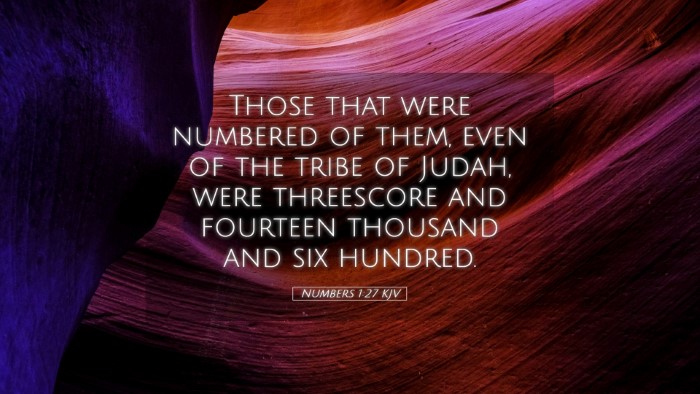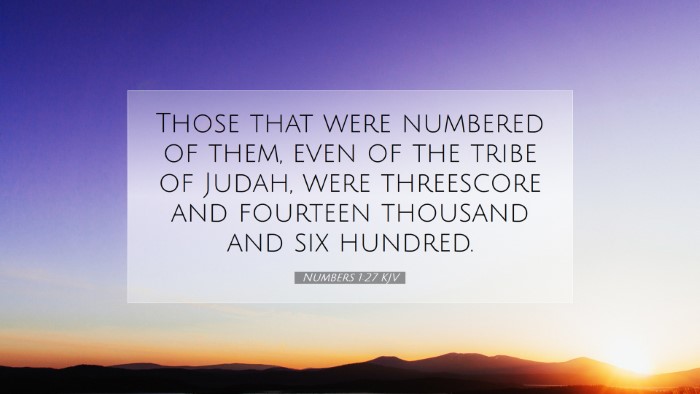Commentary on Numbers 1:27
Numbers 1:27 states: "Those that were numbered of them, even of the tribe of the children of Judah, were threescore and fourteen thousand and six hundred."
Introduction
The Book of Numbers offers a vital historical and theological narrative regarding the Israelites as they journey through the wilderness. In chapter 1, a census is commanded by God, indicating the organization of the tribes as they prepare to enter the Promised Land. Numbers 1:27 specifically refers to the tribe of Judah, which holds significant prominence among the tribes of Israel. This commentary synthesizes insights from renowned scholars to enrich the understanding of this passage.
Exegesis of Numbers 1:27
The Historical Context
The numbering of the tribes serves various purposes. According to Matthew Henry, this census was important for military organization, indicating the readiness of Israel to face the challenges ahead. The tribe of Judah, being the largest in terms of numbers, signifies a leadership role among the tribes, as God's promises to Abraham, Isaac, and Jacob included the establishment of a lasting legacy through Judah.
Theological Implications
Albert Barnes elaborates on the importance of Judah's numerical strength. The mention of "threescore and fourteen thousand and six hundred" highlights not only the physical strength of the tribe but also the divine favor upon them. The tribe of Judah is noted throughout Scripture for its association with kingship, culminating in the Messiah's lineage (Matthew 1:2-3). Thus, this passage bears significance in the foreshadowing of Christ's rightful place as King.
Commentary Insights
Matthew Henry's Perspective
Henry emphasizes the significance of the census not just as a count, but as a divine endorsement of Israel's organization under God's authority. The precision of the numbers reflects the meticulous nature of God’s plan for His people. He notes the tribe of Judah's future prominence and how this tribe would ultimately lead the way in both military and spiritual fronts. Moreover, the inclusion of such details serves to remind the reader of God’s faithfulness in fulfilling His promises to the patriarchs.
Albert Barnes’ Analysis
Barnes reflects on the military and governmental implications of the census. He suggests that the configuration of the camps around the Tabernacle, with Judah leading, highlights the importance of God at the center of national life. The large numbers illustrate the blessings of fecundity that God has bestowed upon the tribe, reinforcing the theme of God’s provision and covenant with His people.
Adam Clarke’s Observations
Clarke dives deeper into the specific number provided in the census. He suggests that the count of "threescore and fourteen thousand and six hundred" serves as a testament to God’s promises of multiplications and victories. Moreover, Clarke mentions that despite the hardships the Israelites would face, God's hand remained upon the tribe, indicating His continual guidance and the significance of their role in the coming events.
Applications for Today
From this passage, pastors and theologians can draw several applications:
- Leadership: Judah's leadership role serves as a model for contemporary church leadership, emphasizing the necessity of being rooted in God’s covenant and faithfulness.
- Community and Identity: The tribe's identity as part of a larger community reflects the importance of belonging to the body of Christ today. Just as Judah was part of the larger nation, individuals are part of the church collectively.
- Faith in Divine Provision: The strength and numerical favor upon Judah illustrate God’s provision. Believers today are called to trust that God will meet their needs as they step forward in faith.
Conclusion
Numbers 1:27 not only recounts a historical fact about the tribe of Judah but also serves as a theological foundation for understanding God's overarching plan for His people. The insights gleaned from public domain commentaries highlight the balanced view of providence, promise, and the practical applications for contemporary believers. The enduring legacy of Judah reminds us that God's covenant extends through the ages, establishing both responsibility and accountability in our walk of faith.


